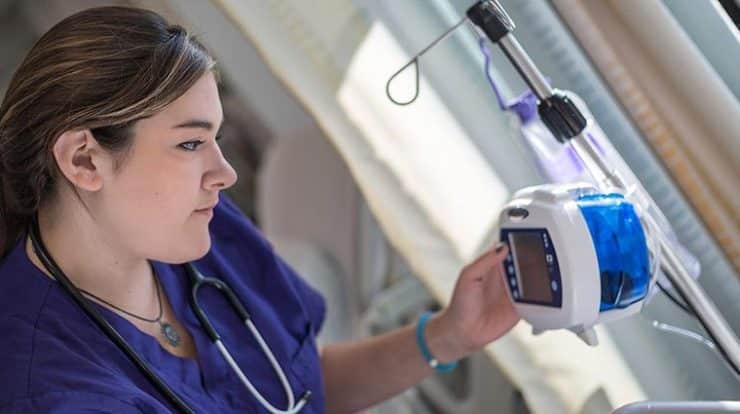What is a family nurse practitioner?
A family nurse practitioner (FNP) is a type of advanced practice registered nurse (APRN) that specializes in the treatment of patients of all ages. Many FNPs begin caring for a patient in infancy and continue providing care for them and/or their family throughout their lifetime. Some of their duties focus on preventive care, such as offering vaccines or cancer screenings, while others help to diagnose and treat existing and chronic conditions.
How do family nurse practitioners differ from other advanced practice registered nurses?
There are four categories of APRNs:
- Nurse practitioners, including FNPs
- Certified nurse-midwives
- Clinical nurse specialists
- Certified registered nurse anesthetists
All aspiring APRNs must first have experience working as a registered nurse (RN) and an RN license. They then need to complete an accredited master’s degree, with a focus on the category of nursing that the student wants to pursue. After specializing in one of these categories, a nurse will complete examinations for their specialty and obtain a license to practice.
FNPs have the option of testing for FNP credentials from the American Nurses Credentialing Center (ANCC) or the American Association of Nurse Practitioners (AANP). The FNP exams include questions on clinical decision-making, patient education, regulatory guidance, assessments and age-appropriate interventions. There may also be additional requirements depending on the state in which the nurse plans to practice.
The roles of the other categories of APRN vary greatly from those of an FNP. A certified nurse-midwife will care only for women’s health from puberty to menopause. A clinical nurse specialist might serve in an educator, researcher or consultant role, or they will support specific populations or health specialties (such as cardiovascular or oncology). Finally, a certified registered nurse anesthetist will administer anesthesia during surgery in a variety of healthcare settings.
Common skills for advanced practice nursing roles
There are a number of skills that all aspiring advanced nurse practitioners are expected to have – these are discussed below.
Communication skills
Nurses must be able to explain complex medical ideas and terms to patients and their families, and explain care plans in a comprehensive yet easily understandable way. They will be expected to listen to patients’ and families’ concerns and provide suitable answers to questions. They are expected to understand the unique circumstances that contribute to each patient’s care and that influence the course of an illness. All nurses will work alongside other healthcare professionals to design care plans or offer treatments based on resources, staff and clinical skill. An FNP will further hone this skill by understanding the appropriate way to communicate with patients of all ages, including children and the elderly.
Clinical skills
A family nurse practitioner must be able to order appropriate diagnostic tests and interpret results, as well as determine effective treatment plans for patients based on their needs and best interests. Other nurses may not order tests, but they will need to interpret the results to determine the next steps in treatment. FNPs and some nurse specialists will help patients handle acute and chronic conditions by managing their symptoms, side effects, and interacting medications. Of course, the scope of FNPs will be more general than that of a specialist. Educational institutions like Walsh University in the United States provide comprehensive programs that equip aspiring nurse practitioners with the knowledge and skills needed to excel in these critical roles within the healthcare system.
Leadership skills
Many APRNs lead a team of RNs or other healthcare professionals, and they may work in conditions that don’t have any higher supervision – especially in rural areas or in areas of physician shortages. As such, they may be primarily responsible for determining the policies and procedures of their place of work and resolving conflict or problems faced by those supervised by an APRN. FNPs will develop further leadership skills due to the longevity of interaction with their patients and their more significant involvement in preventive care. They need to be able to motivate their patients to pursue the correct course of action and collaborate with other healthcare providers to ensure consistency of care.
Critical thinking skills
APRNs must be able to make well-informed decisions about the best care for their patients. To do so, they need to analyze many different sources of information and determine how they would impact the patient. A patient’s needs, identity, concerns, values and goals are taken into consideration, and an APRN will identify potential problems for any of these within the treatment plan and develop necessary alternatives or support. FNPs have a wider breadth of information to understand, as the factors influencing care for an infant will be radically different from those impacting an adolescent or older person.
Empathy
APRNs must be able to understand the unique needs and goals of their patient. For FNPs, this will be relative to patient’s stage of life. In order to make the best decisions, an APRN must take the time to understand what is important to the patient and provide them with respectful and compassionate care that honors their dignity. FNPs are particularly suitable for providing empathy as they tend to have more frequent and long-lasting contact with their patients. Therefore, they can come to better understand the patient and their needs better than any other healthcare professionals.
Lifelong learning
Because the field of medicine is constantly changing and practices are improving, an APRN must have a thirst for knowledge that motivates them to research the latest research and strategies for care. Similarly, healthcare professionals need to constantly understand their patient and the progress of any chronic conditions. FNPs, who have more significant care relationships with patients, need to be flexible in learning about their patients and adjusting the course of care as they grow older and experience new life experiences that impact their goals and needs.
Skills that are unique to family nurse practitioners
Due to the unique duties performed by FNPs, there are skills required of them that might not be found among other categories of APRNs.
Understanding of needs based on various life stages
FNPs must be able to provide appropriate care for patients of all ages, from infancy to old age. This requires an FNP to be aware of the issues and needs of each life phase, and to learn about pediatrics, geriatrics and adult medicine. As medicine in all branches is frequently changing and progressing, FNPs need to stay informed of best practices.
Understanding of chronic conditions and how to manage them
FNPs help patients manage a diversity of conditions that may be acute or chronic. Each patient’s treatment plan must take into consideration what they need at that moment, how it may interact with treatment for other issues, and what type of support will help them manage chronic conditions such as diabetes, high blood pressure or cholesterol, or asthma. An FNP’s long-term familiarity with a patient can help guide their decision-making when it comes to comprehensive treatment.
Providing preventive care
FNPs are often a main source of advice and care to prevent future health issues. This requires an understanding of what factors may lead to future health complications, and also the best way to communicate risk factors to patients who may not be receptive to health interventions.
Flexibility to work in many different work environments
FNPs can work in many different settings, including hospitals, schools, clinics, private practices, or even remotely. They therefore need to be able to manage and structure their environment in a way that allows them to be comfortable and efficient. In settings where there is no supervision, FNPs need to be independent; and in settings where FNPs supervise others, they must be accessible and supportive. They also need to consider the resources that are available in each of these places and cater their treatment plans and interventions based on what can be realistically provided for patients.
Commitment to patients over time
Many FNPs work with patients for many years. Therefore, they need to understand the changes that a person goes through, and use that familiarity to observe warning signs that might otherwise be overlooked. However, they must not become overly attached and allow personal feelings to impact their judgment.
Conclusion
FNPs are only one type of APRN, and the role requires different training and skills from others. Due to the clinical nature of the FNP’s role, as well as the long-term relationship that an FNP develops with patients across all ages, this category of APRN requires a wider level of medical knowledge and more diverse social awareness. Although it can be challenging, FNPs play a crucial role in delivering high-quality care for patients over their lifetime.







